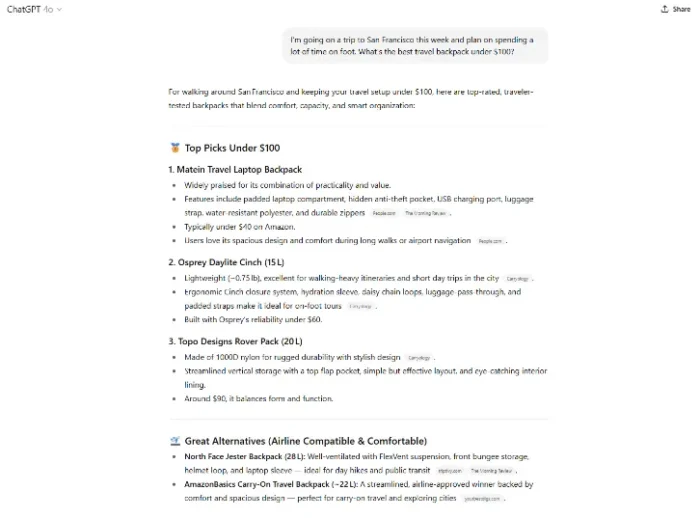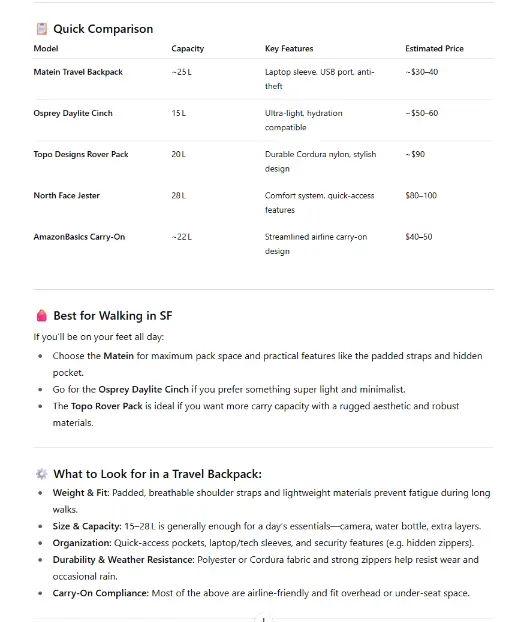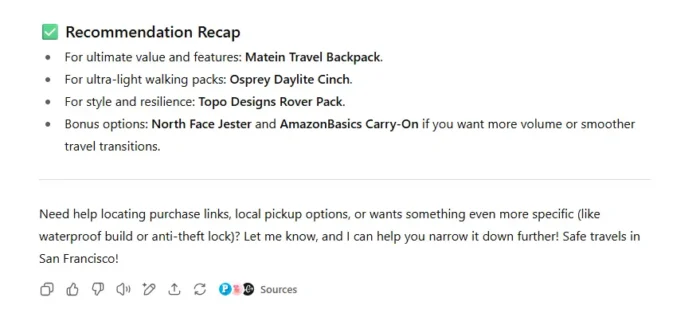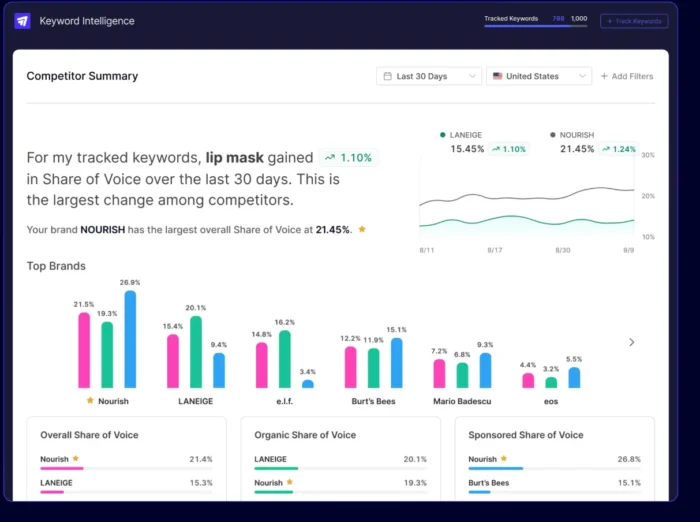“What’s the very best water bottle for climbing in scorching climate?”
As soon as upon a time, this was a query you’d ask a good friend or even perhaps a search engine. As of late, extra customers are asking ChatGPT or Bing for product suggestions as an alternative. However as an alternative of pointing them to weblog posts or product roundups, these companies routinely reply with just a few top-rated insulated bottles. They record manufacturers and clarify why every one works effectively in excessive warmth. Typically, they’ll even pull a execs and cons record based mostly on verified consumer evaluations.
No link-hopping. No looking out. Simply solutions.
That’s what AI buying assistants like Rufus and ChatGPT do. They summarize, rank, and serve up product suggestions within the dialog. Amazon’s Rufus does this natively, utilizing real-time catalog information to suggest listings immediately out of your product description pages (PDPs).
For those who don’t make AI an integral a part of your e-commerce answer, you’re already lacking out. AI is now not the longer term; AI is the filter your prospects use to buy right now.
Key Takeaways
- AI buying assistants like ChatGPT and Rufus now suggest merchandise immediately in search outcomes.
- Product discovery is altering. In case your Amazon PDP doesn’t spotlight real-world advantages, you received’t get surfaced.
- These instruments favor readability, construction, and evaluations over key phrase stuffing. Helpful beats optimized.
- You’re not serving to an algorithm, however a buyer. AI simply makes positive the very best solutions rise to the highest.
- Sensible sellers modify PDPs to remain seen and aggressive in AI-driven buying environments.
How AI Buying Assistants are Altering Search Outcomes
As an alternative of an inventory of hyperlinks, extra customers search (and discover) direct solutions to questions through LLMs like ChatGPT, together with product picks.
Ask ChatGPT, Rufus, or different instruments one thing like “finest standing desks for small areas,” and also you’ll get a curated record of merchandise, typically pulled from Amazon, with detailed descriptions and advantages or drawbacks. Amazon’s Rufus software does this inside its app, serving product recs throughout the search circulate.
Rufus has transitioned from a sidebar function to a entrance door to product discovery and one other component of the “Search In every single place” mindset.
That shift issues, each to customers and types. When AI buying assistants serve outcomes, they now not pull essentially the most optimized pages by default. They interpret context and match purchaser intent. The purpose? To spotlight merchandise that appear most helpful, not essentially those with the very best key phrase density.
In an AI buying assistant search expertise, the assistant is the curator. It summarizes evaluations, analyzes product element descriptions, and ranks choices for every particular person consumer based mostly on usefulness, not metadata.
Why Amazon Sellers Ought to Care
In case your merchandise don’t present up in these overviews, guess whose will?
AI buying assistants are already showcasing merchandise from Amazon of their solutions. In case your PDP isn’t optimized for this new expertise, you’ll be neglected within the chilly.
When somebody asks Rufus or ChatGPT for “the very best journey backpack below $100,” the assistant pulls in just a few choices and provides summaries, scores, and product highlights. Solely a handful of choices make the minimize.



The immediate for this query was extremely naked bones. With extra element, ChatGPT might doubtless supply much more related merchandise.
Amazon sellers must rethink their AI buying technique. Visibility now not comes from rating in conventional search outcomes. As an alternative, you should be the product that AI buying assistants title, summarize, and suggest in actual time.
Sellers who adapt quick will seize market share with out rising advert spend. Those that stick with outdated PDP constructions will watch their rivals acquire visibility whereas their very own merchandise get neglected, even when conventional rankings seem steady.
Right here’s what issues most: as soon as AI buying assistants begin to favor well-structured, benefit-forward listings, there’s no going again. You’re both within the product rec loop, otherwise you’re not.
How AI Buying Assistants Select Merchandise
AI buying assistants symbolize a serious shift from keyword-matching to intent-matching. In contrast to conventional search algorithms that reward optimization techniques, AI fashions prioritize actual utility and buyer satisfaction, aligning completely with long-term enterprise success.
Readability in Product Advantages
AI fashions scan for product pages that clearly clarify what the merchandise does for the consumer. In case your itemizing highlights “light-weight design for all-day put on” or a “fast-charging battery that lasts 12 hours,” that’s gold. Generic function dumps or spec lists? Not a lot.
Structured Knowledge
Structured product data helps AI perceive your itemizing sooner. Bullet factors that summarize key specs, constant formatting, and well-labeled fields give the mannequin extra to work with and enhance your probabilities of getting beneficial.
Constructive Evaluations and Social Proof
AI buying assistants pull in evaluate content material when it’s accessible. They reference widespread buyer reward, star scores, and repeat suggestions developments. If 50 folks mentioned your jacket runs true to dimension and holds up within the rain, it might present up in a response. Even the staple product suggestion or fanatic web sites like Tom’s Information or Wirecutter often pop up as character witnesses for merchandise.

ChatGPT sources particulars from fanatic web sites and third-party reviewers to assist inform its suggestions.
Excessive Relevance to the Question
AI assistants are nice at matching intent. If somebody asks for a quiet blender for small residences, the mannequin will prioritize listings that point out noise degree, dimension, and kitchen match.
So what’s the takeaway? Key phrase-stuffing is a factor of the previous. You want actual readability, high quality, and indicators to inform the AI: That is the one!
Sensible Steps to Optimize Your Amazon PDPs
You’re not optimizing for AI. You’re optimizing for the consumer. AI buying assistants are simply the bridge. They pull in merchandise to talk clearly about what prospects are asking for.
If Rufus and ChatGPT floor your listings, your PDP answered the query higher than anybody else. The purpose is to not “trick” the mannequin however to make it inconceivable to disregard your product.
Right here’s how to do this:
Step 1: Clearly Spotlight Actual-Life Advantages
Most PDPs speak about what a product is. AI buying assistants (and your prospects) wish to know what it does. Evaluate these two potential listings:
- “Created from high-density foam, measures 24×18 inches”
- “Excessive-density foam cushions sore joints, which is ideal for lengthy yoga classes.”
It’s a tiny shift that places the advantages entrance and middle, precisely the sort of language instruments like Rufus choose up on.

That is from an Amazon product itemizing for a yoga mat.
Take a minute to flick thru precise Rufus prompts. Folks don’t seek for “12 oz chrome steel tumblers.” They search for “cups that preserve drinks chilly all day,” or “easy-to-clean journey mugs for teenagers.” Construct your PDPs round these use instances.
Communicate your prospects’ language. The AI will reward it.
Step 2: Prioritize Structured Knowledge and Clear Formatting
AI buying assistants scan for construction. They want clear information to parse and current your itemizing as a reputable suggestion. Right here’s what helps:
- Bullet factors that break down options and advantages
- Constant formatting throughout titles, descriptions, and variations
- Upfront pricing and availability information
- Alt textual content and backend key phrases that reinforce readability, not muddle
Instruments like Rufus can solely do their job effectively if the info they pull from is organized. Schema markup and enhanced model content material (EBC) assist, too, however even fundamental formatting upgrades make a distinction.
Don’t bury your advantages in a wall of textual content. Make them simple to search out for each the consumer and the assistant.
Step 3: Strengthen Evaluations & Social Proof
AI buying assistants consider evaluate quantity, sentiment, and consistency once they determine which merchandise to serve. If an inventory has clear themes, like “simple to assemble” or “nice for journey,” these indicators will get picked up.
If you’d like extra of these, begin by:
- Following up on each buy with a evaluate request (Amazon’s “Request a Evaluation” software helps).
- Utilizing inserts that ask for suggestions in a pure, non-pushy method.
- Resolving buyer points shortly to keep away from detrimental evaluations.
Lastly, floor your strongest evaluations and have them in your A+ content material or EBC modules. AI fashions will doubtless point out what’s already being repeated and strengthened throughout the itemizing.
Manufacturers investing in real buyer expertise will see compound returns as AI adoption accelerates. These counting on optimization methods face declining visibility.
Constructing an AI Visibility Intelligence System
AI buying assistants replace their suggestions constantly. Sensible sellers construct systematic monitoring to catch shifts earlier than their rivals.
Right here’s a pattern plan for how you can keep forward:
Week 1: Set up a Baseline
Check 10 customer-style queries on your prime merchandise in ChatGPT, Rufus, or different LLMs. Doc which merchandise seem and their positioning. Observe key metrics like key phrase rankings or itemizing site visitors utilizing instruments like Helium 10 or Jungle Scout.

Jungle Scout’s Key phrase Intelligence software helps present visibility for tracked key phrases.
Weeks 2-3: Implement Fast Wins
Rewrite product titles and bullet factors on your three worst-performing listings. Add structured information the place it’s lacking and enhance your formatting consistency. A/B check benefit-focused language versus feature-focused. Launch a evaluate era marketing campaign for merchandise with fewer than 50 evaluations.
Week 4: Measure Preliminary Impression
Re-test your unique 10 queries and be aware place modifications. Evaluate site visitors and conversion metrics to your week 1 baseline. Determine modifications that moved the needle most and use these insights to create an optimization playbook for all merchandise shifting ahead.
Ongoing Monitoring (Month-to-month)
Monitor what AI instruments suggest when prospects ask about your product class and observe how prospects phrase questions. You need to use Rufus search recommendations or ChatGPT dialog starters for this. Lastly, join AI visibility modifications to site visitors and gross sales information.
You may as well arrange Google Alerts on your model + “finest [product category]” to catch when Google’s AI Overviews point out you in public responses.
FAQs
How do AI buying assistants like ChatGPT choose merchandise?
ChatGPT and instruments prefer it do greater than “search.” They curate. They pull in product information, evaluations, specs, and consumer suggestions to suggest objects that match what consumers ask for. There’s a brand new wrinkle, too: OpenAI is testing affiliate partnerships, the place they’ll earn a minimize from beneficial merchandise that convert. This incentivizes them to floor merchandise that result in gross sales, not simply clicks.
What modifications ought to I make first on my Amazon product pages?
Start with readability. Rewrite bullets and descriptions to concentrate on real-world advantages, like what the product does and the issues it solves. Use clear and simply scanned formatting. Lastly, test your evaluations. If prospects name out key advantages, floor these in your itemizing.
Are key phrases nonetheless essential with AI buying assistants?
Sure, however not within the outdated method. Key phrases assist AI perceive context, however key phrase stuffing received’t assist. As an alternative, use pure phrasing that matches how prospects ask questions. Phrase your content material round issues and outcomes, not simply specs.
{
“@context”: “https://schema.org”,
“@sort”: “FAQPage”,
“mainEntity”: [
{
“@type”: “Question”,
“name”: “How do AI shopping assistants like ChatGPT select products?”,
“acceptedAnswer”: {
“@type”: “Answer”,
“text”: “
ChatGPT and tools like it do more than “search.” They curate. They pull in product data, reviews, specs, and user feedback to recommend items that match what shoppers ask for. There’s a new wrinkle, too: OpenAI is testing affiliate partnerships, where they’ll earn a cut from recommended products that convert. This incentivizes them to surface products that lead to sales, not just clicks.
”
}
}
, {
“@type”: “Question”,
“name”: “What changes should I make first on my Amazon product pages?”,
“acceptedAnswer”: {
“@type”: “Answer”,
“text”: “
Begin with clarity. Rewrite bullets and descriptions to focus on real-world benefits, like what the product does and the problems it solves. Use clean and easily scanned formatting. Finally, check your reviews. If customers call out key benefits, surface those in your listing.
”
}
}
, {
“@type”: “Question”,
“name”: “Are keywords still important with AI shopping assistants?”,
“acceptedAnswer”: {
“@type”: “Answer”,
“text”: “
Yes, but not in the old way. Keywords help AI understand context, but keyword stuffing won’t help. Instead, use natural phrasing that matches how customers ask questions. Phrase your content around problems and outcomes, not just specs.
”
}
}
]
}
Conclusion
The shift is accelerating: AI buying assistants are quickly turning into a major channel for product discovery. Main platforms like Amazon, Google, and Microsoft have already invested billions in AI-powered commerce experiences. Early movers are capturing market share and leaving their rivals within the mud.
The underside line? Sellers who optimize for AI buying now will personal the dialog when their prospects ask for suggestions. Those that wait will discover themselves explaining why they’re not value mentioning.
One of the best technique to enhance your Amazon listings is to trace your progress and take actionable steps to enhance. For those who haven’t seen enchancment inside 60 days, you’re doubtless leaving cash on the desk.

